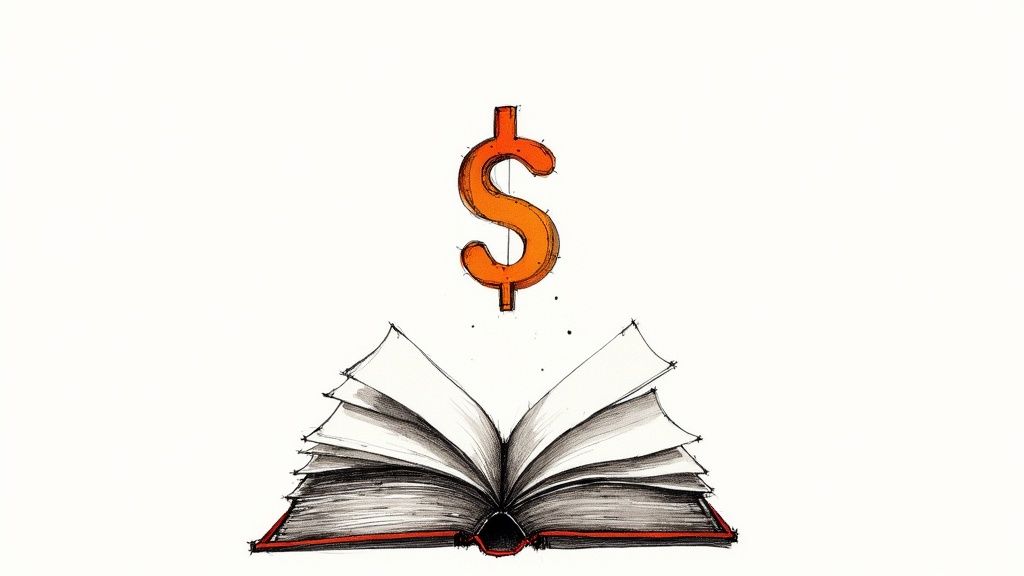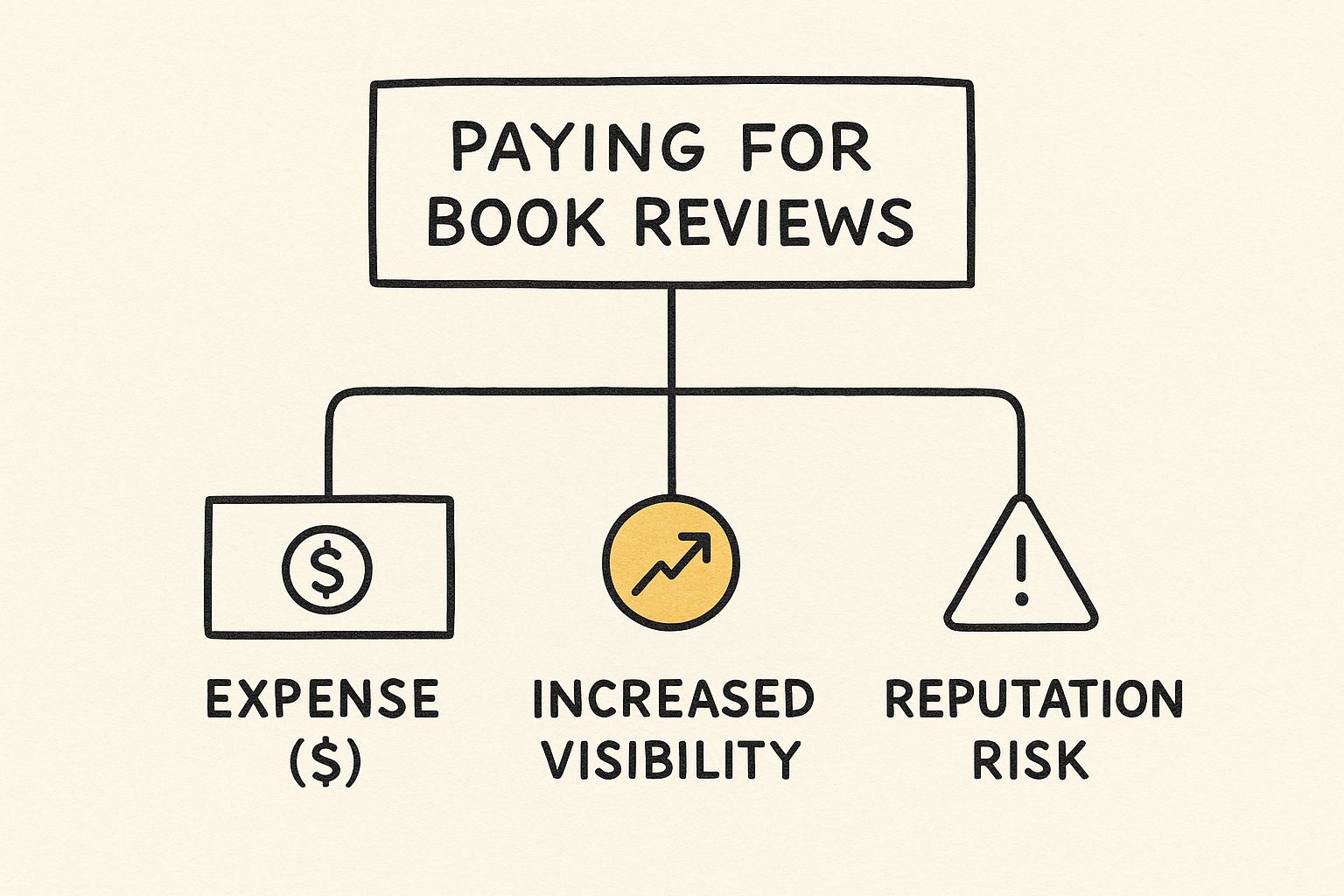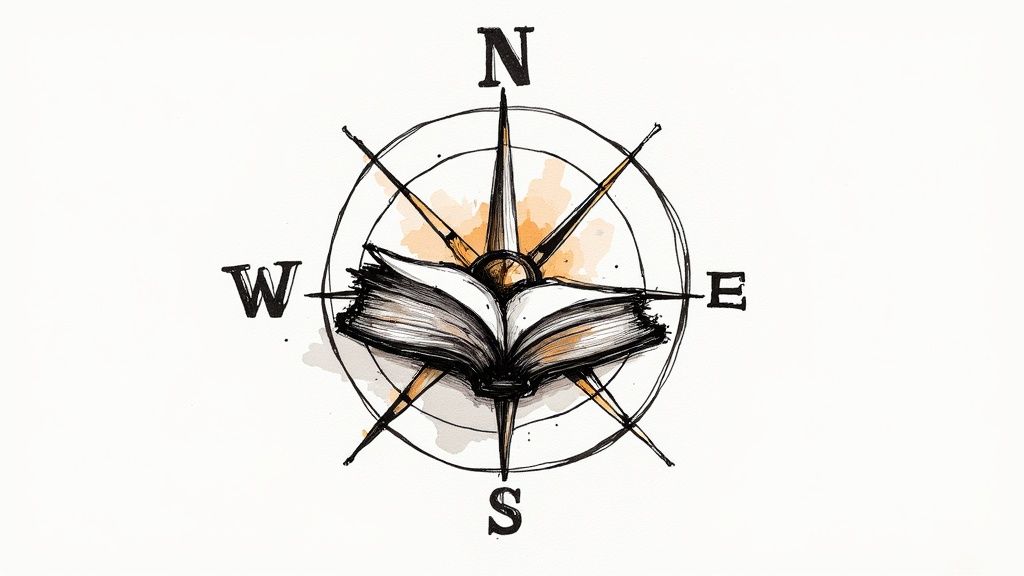Paying for Book Reviews A Guide for Modern Authors

Let’s be honest: seeing "0 reviews" next to your newly published book is every author's worst fear. It’s a tough reality, and it’s why many authors find themselves wondering if they should pay for book reviews. When done the right way, it’s not some shady back-alley deal. It can be a perfectly legitimate way to get professional, honest feedback and give your book a fighting chance in a seriously crowded market.
Why Authors Consider Paying for Book Reviews

Imagine you’ve just opened a new restaurant. Your food is incredible, the ambiance is perfect, but the place is empty. Why? Because nobody knows you exist yet. You need those first few diners to come in, try the food, and start spreading the word. Without that initial buzz, even a five-star restaurant can go out of business.
Authors face the exact same problem. Relying on readers to stumble across your book and leave a review organically can take forever. That's where paying for a review service comes into the picture—not as a shortcut to fake praise, but as a practical marketing tool.
The Challenge of Gaining Initial Traction
The world of self-publishing has completely changed the game. With over 700,000 new books hitting the shelves each year—half of them self-published—the competition is absolutely fierce. Traditional reviewers are swamped, and it’s become incredibly difficult for new authors to get noticed. You can explore more about these publishing trends to see just how big the numbers are.
This intense environment pushes authors to look for other ways to create that crucial early momentum. The main goals are usually pretty straightforward:
- Build Social Proof: A book with a few well-written reviews just looks more trustworthy and interesting to a potential reader than a book with zero.
- Gain Early Visibility: Reviews are a key signal to retailer algorithms. More reviews can mean better visibility on sites like Amazon.
- Secure Professional Blurbs: A paid editorial review from a reputable source gives you fantastic quotes to splash on your book cover, website, and promotional materials.
A paid editorial review acts like a spotlight in a crowded room. It doesn’t change the quality of your book, but it makes it much harder for readers—and the industry—to ignore it.
Think of it as another professional service you invest in. You pay an editor to refine your manuscript and a cover designer to create your art. Paying a service for an honest, professional assessment of your work is a similar strategic investment. It’s all about kickstarting the conversation and giving your book a real opportunity to connect with its audience before it disappears into the digital void.
2. Understanding the Rules: What's Allowed and What Isn't
Dipping your toes into the world of paid book reviews can feel a little precarious, like walking a tightrope. It’s absolutely critical to know where the industry draws the line between legitimate marketing and a serious violation that could torpedo your writing career.
The distinction itself is pretty straightforward, but it’s non-negotiable: You can pay for someone’s time and professional opinion, but you can never, ever pay for a positive review.
Here’s a simple way to think about it. Paying a service to guarantee you a 5-star review is like trying to bribe a judge for a favorable verdict. It's a blatant attempt to rig the system, and platforms like Amazon have zero tolerance for it.
On the flip side, paying a respected outlet for a professional editorial review is more like a restaurant owner hiring a well-known food critic. You're compensating them for their time and expertise in evaluating your work, not for a glowing recommendation. The critic might love the food or they might hate it—the outcome is never guaranteed, but the process is transparent and seen as perfectly legitimate.
This visual really gets to the heart of the cost-benefit analysis you have to do.

As you can see, the financial cost is a given. But the real balancing act is weighing the potential upside of more visibility against the massive risk to your reputation if you cross that ethical line.
The FTC and Why Disclosure Is a Big Deal
In the United States, the Federal Trade Commission (FTC) has some very clear rules about endorsements. The moment a "material connection" exists—meaning you paid for a review or even just provided a free book for it—that connection must be clearly disclosed.
This isn't about shaming anyone; it's all about consumer transparency. Think of it like a sponsored post on Instagram or a product placement in a movie. The audience deserves to know if the opinion they're reading might have been influenced by a transaction.
A simple, honest sentence usually does the trick. Something like, "I received a free copy of this book in exchange for an honest review," is all it takes.
The Bottom Line: Forgetting to disclose a paid or incentivized review isn't just a simple mistake; it's a violation of FTC guidelines. Being transparent is what protects both you and your readers.
Subscribe & Get Your Free Marketing Plan Template
Receive regular updates on marketing best-practices, AI shortcuts, and get our proven 4-phase marketing roadmap for free.
Unsubscribe anytime.
How Different Platforms Handle Paid Reviews
On top of the FTC's rules, major retailers and review sites have their own policies, and you need to know them inside and out to avoid serious trouble.
Amazon's Hard Line: Amazon is famously strict and explicitly prohibits any form of "compensation for a review." This covers money, gift cards, or any other incentive for a customer review. Getting caught can mean having the review deleted, all of your book's reviews wiped clean, or even getting your entire account suspended. That said, Amazon does allow editorial reviews from professional services (like Kirkus Reviews) to be featured in their own designated section on your book's page.
Goodreads' Community Focus: Goodreads operates on a similar foundation of trust. The platform forbids reviews that are paid for or incentivized to be positive. The entire community is built on genuine reader opinions, and any hint of trying to game the system is met with a swift response. While disclosed ARC reviews are a standard and accepted practice, paying someone directly for a high star rating is a clear violation of their community guidelines.
To help clarify this crucial distinction, let's break down the difference between a legitimate editorial review and a prohibited paid-for-positive review.
Paid Editorial Reviews vs. Paid Positive Reviews
| Practice | Ethical Approach (Disclosure Required) | Unethical Approach (Violation) | Platform Consequence |
|---|---|---|---|
| Payment | Paying for the reviewer's time and professional labor to produce an objective critique. | Paying specifically for a high rating (e.g., 4 or 5 stars) or positive comments. | Violation. Could lead to review deletion or account suspension. |
| Outcome | The review can be positive, negative, or mixed. The outcome is not guaranteed. | A positive review is guaranteed as a condition of payment. | Violation. Seen as manipulating customer reviews. |
| Disclosure | The review must clearly state it was the result of a paid service or a free copy. | The transaction is hidden to make the review appear organic and unbiased. | Violation. Breaks both platform rules and FTC guidelines. |
| Placement | Posted in a designated "Editorial Reviews" section (on Amazon) or on the reviewer's professional site/publication. | Posted directly in the "Customer Reviews" section to artificially inflate the star rating. | Violation. Deceptive and circumvents platform design. |
Ultimately, the golden rule here is to always put honesty first. Paying for a book review is a perfectly valid marketing tactic, but only when you are paying for an honest critique and are completely transparent about the transaction. This approach not only keeps you on the right side of the rules but also helps you build something far more valuable in the long run: a reputation for trustworthiness with your readers.
Is It Worth the Money? Weighing the Real Pros and Cons

So, should you actually pay for book reviews? The truth is, it’s a strategic marketing decision, not a moral one. You have to take a clear-eyed look at what you stand to gain versus what you risk losing. It’s a cost-benefit analysis that isn't always cut and dried.
The single biggest argument in favor of paid reviews is speed. Think about it. You can get a professional, credible review locked in within a few weeks. That’s a massive shortcut compared to the months—or even years—it can take to build up organic reviews from scratch. This initial kickstart can be exactly what a new book needs to get noticed.
That speed directly feeds your marketing machine. A killer pull-quote from a respected editorial review is pure gold. You can splash it on your book cover, drop it into your Amazon description, and feature it in all your social media posts.
The Upside: Gaining Critical Momentum
A smart, well-placed paid review can create a fantastic snowball effect. The initial visibility it generates sparks reader interest, which can drive sales. More sales, in turn, often lead to more organic reader reviews. It all works together.
- Fast-Tracked Credibility: In a sea of new releases, a professional review gives your book instant legitimacy. It signals to potential readers that your work is worth their time.
- Powerful Marketing Assets: You’re not just getting a review; you're getting high-quality blurbs and quotes to weave into all your promotional efforts, making your sales pitch that much stronger.
- Algorithm Boost: Early reviews and sales send positive signals to retailer algorithms, especially Amazon's. This tells the system your book is relevant, which can lead to it being shown to more shoppers.
The Downside: The Real Risks Involved
But let’s not get ahead of ourselves. The downsides are very real and require serious thought. The most immediate one is the financial hit. Reputable editorial review services are an investment, and when you’re running your author business, every dollar counts. Tools like budgeting tools for creators can be a lifesaver when you're trying to figure out if you can afford this kind of expense.
Maybe the biggest gamble, though, is the review itself. Remember, you’re paying for an honest, professional opinion—not a guaranteed positive one. This is a crucial distinction. You could spend hundreds of dollars only to get a lukewarm or even negative review. Then you're stuck: either publicize a bad review or bury it, essentially wasting your money.
A paid review is an amplifier, not a creator, of quality. If a book has underlying issues with plot, character, or editing, a professional review will likely highlight them, not hide them.
Finally, there’s the hit to your reputation. If you get mixed up with a low-quality or "guaranteed positive" review mill, it can permanently stain your credibility with both readers and the wider industry. Being seen as someone trying to game the system is often far more damaging than just having no reviews to begin with.
The temptation is understandable. Research suggests books with more positive reviews can see sales jump by 20-50%. Ultimately, you have to decide if the potential rewards are worth the financial and professional risks you’re taking on.
Finding Reputable Paid Review Services
So, you've weighed the pros and cons and decided that a paid review service is the right move for your book. Fantastic. Now comes the real challenge: finding a good one. This isn't a step to rush, because the wrong choice can be a waste of money at best and a hit to your reputation at worst.
https://www.youtube.com/embed/cV2aGR5Skcs
Think of this process like hiring a professional literary critic, not a personal cheerleader. The best services have built their entire business on a foundation of impartiality. In fact, a core principle for many of them is that the reviewer never knows the author paid for the review. This creates an ethical firewall, ensuring the feedback is completely objective. It’s what separates a legitimate editorial review from a fake, paid-for-positive one.
Top-Tier Editorial Review Services
Some of the biggest names in the publishing industry offer paid review programs tailored for indie authors. Landing a positive review from one of these is a huge credibility booster and can give you some killer marketing blurbs for your book cover and sales page.
Kirkus Indie: This is one of the heavy hitters. For a fee (usually several hundred dollars), Kirkus delivers a detailed, professional review of about 250-300 words. A positive blurb from Kirkus is a massive seal of approval that can be featured in their magazine and online, giving your book serious authority.
Foreword Clarion Reviews: Much like Kirkus, Clarion provides in-depth, professional reviews for indie authors. They give your book a star rating, and the review is written by one of their experienced, pre-screened reviewers. It's another top-notch way to get a credible, unbiased opinion.
PW's BookLife: Run by the industry giant Publishers Weekly, BookLife is another fantastic option. When you pay for a review here, your book is assessed by an actual PW reviewer. There’s no guarantee of a glowing review, of course, but you get invaluable, honest feedback and a shot at major exposure if they love it.
Here’s a glimpse at the Kirkus Indie author services page, showing how they frame their offerings for independent authors.
You can see how established services position themselves as professional tools. They’re all about discoverability and credibility, not "pay-for-praise" schemes. Think of it as an investment in professional feedback, not a transaction for a five-star rating.
Platforms for Reaching Consumer Reviewers
Moving beyond the big editorial names, there are also platforms designed to connect you with a whole community of everyday readers. The goal here is a bit different. It’s less about getting that one perfect professional blurb and more about kickstarting a steady flow of consumer reviews on sites like Amazon and Goodreads.
NetGalley: This is probably the most well-known platform in this space. For a fee, you list your book on NetGalley for a specific time, opening it up to thousands of librarians, booksellers, educators, and die-hard book reviewers. It's important to understand you aren't paying for reviews; you're paying for access to this incredible community of potential readers.
While these services offer a great launchpad, they're just one part of a much bigger marketing strategy. To really see the whole picture and position your book for success, you'll want to explore a full suite of tools to help you market your book effectively.
At the end of the day, a smart investment means picking the service that truly matches your goals—whether that's snagging a powerful blurb from a trusted name or building a solid base of reader reviews.
Smarter Ways to Get Book Reviews for Free

While paying for reviews can give you a quick boost, it's definitely not the only game in town. What if your marketing budget is hovering around zero? Good news: some of the best and most sustainable ways to get reviews won't cost you a dime.
These methods do require you to invest your time and energy, but the return is often far more valuable than a single paid-for blurb. You're not just making a transaction; you're building genuine connections and a real community around your work. This creates a network of actual fans who will not only review this book but will be excited for your next one. That's how you build a real author career.
Build Your Advance Reader Copy Team
One of the most powerful tools in any author's arsenal is a dedicated Advance Reader Copy (ARC) team. This is simply a hand-picked group of readers who get a free, early copy of your book before it's officially released. The unwritten rule is that they'll post an honest review on Amazon, Goodreads, or other sites right around your launch day.
You don't need a huge following to get started. You can pull people directly from the audience you already have.
- Your Newsletter: Pop a sign-up form in your newsletter and invite your most loyal subscribers to an exclusive "launch team."
- Social Media: Put out a call for volunteer reviewers on your favorite social media platform when your release is getting close.
- Your Website: Create a permanent page on your author site where interested fans can apply to join your ARC team anytime.
This strategy cultivates a core group of supporters who feel like they're a special part of your journey.
An ARC team is more than just a source of reviews; it's the foundation of your author community. These are the readers who will generate early buzz, recommend your book to friends, and become your most loyal advocates.
Leverage Free Review Platforms
If you're still working on building that audience, don't worry. Several platforms exist to connect authors with readers who are actively looking for new books to review. Think of them as matchmaking services for the book world.
BookSirens: This platform lets you list your book for free to a big community of reviewers. BookSirens handles the distribution and even vets readers to make sure they have a history of actually following through and leaving reviews.
StoryOrigin: This is an amazing all-in-one hub for authors. StoryOrigin helps you manage ARC distribution, find reviewers, and even join in on newsletter swaps with other authors in your genre, which is a great way to find new readers.
Reach Out to Book Bloggers and Influencers
Contacting book bloggers and "Bookstagrammers"—the book-obsessed influencers on Instagram—is another fantastic, free strategy. Research shows that influencers with smaller, highly engaged niche followings can create serious buzz. The trick is to be personal, professional, and respectful. Your email should be a thoughtful pitch, not a copy-and-paste job.
This kind of outreach is a core part of any good marketing plan, which you can read more about in our complete guide on https://manuscriptreport.com/blog/how-to-promote-your-book.
When you write to them, prove you've done your homework. Mention a specific review they wrote that you liked and explain why your book would be a perfect fit for their audience. Many influencers are thrilled to receive free books, and the same principles of getting feedback apply across the board. In fact, you can find some proven tips on how to get customers to leave reviews that are surprisingly relevant here, too.
Your Questions About Paid Book Reviews Answered
When authors start looking into paid book reviews, a few key questions almost always bubble to the surface. It's a confusing part of the publishing world, so let's cut through the noise and tackle the most common concerns head-on.
How Much Should a Book Review Really Cost?
You'll see a huge range of prices for book reviews, and honestly, you tend to get what you pay for. At the very bottom, you might find freelancers on gig platforms offering to post a review for as little as $20. Be warned: these are almost always unethical, guaranteed-positive reviews that flat-out violate platform rules and can do serious damage to your reputation.
On the flip side, you have the established, professional editorial review services. Think of big names like Kirkus Indie or Foreword Clarion. These legitimate reviews can run anywhere from $400 to over $600. What you're paying for here is an objective, professionally written critique from a seasoned reviewer—not a guaranteed five-star rating. The price tag reflects the service's credibility, the reviewer's experience, and the marketing power a blurb from them can carry.
The core difference is what you're buying: legitimacy or a liability. A cheap review buys you a high-risk gamble, while a premium editorial review buys you a professional, unbiased assessment that can provide powerful marketing assets.
Can Amazon Really Ban Me for Buying Reviews?
Yes. Full stop. Don't let anyone tell you otherwise. Amazon's policies are incredibly clear and they enforce them without hesitation. Paying for a fake positive customer review is a direct violation of their Community Guidelines because it’s a blatant attempt to manipulate the system and trick shoppers.
If you get caught, the fallout can be swift and severe. Amazon might:
- Delete the review instantly.
- Wipe out all of your book's existing reviews.
- Suspend or even permanently ban your KDP author account.
It's critical to understand the distinction, though. This policy is all about fake customer reviews. It is perfectly acceptable to get a paid editorial review from a reputable service and post it in the "Editorial Reviews" section on your book's product page. This is the only safe and ethical way to use a paid review service without putting your entire author career on the line.
For a deeper dive into common concerns, you can explore the Frequently Asked Questions page for more insights.
Are Paid Review Services a Good Investment?
This is the million-dollar question, isn't it? The answer is... it depends. It really comes down to your book, your budget, and what you’re trying to achieve.
For an author with a professionally edited, polished manuscript and a solid marketing budget, a high-quality editorial review can be a fantastic investment. It gives your book that crucial initial stamp of credibility and a killer quote you can slap on your book cover and use in all your ads.
But if your goal is just to rack up a high number of reviews to try and game the Amazon algorithm, paid services are the wrong tool for the job. You'll get a much better return on your time and money by building an ARC team and using free review platforms. Think of it this way: a paid review amplifies a great book; it can't rescue a book that isn't ready.
Ready to turn your manuscript into a complete marketing toolkit? ManuscriptReport.com generates everything you need—from blurbs and keywords to social media posts and ad copy—in just 10 minutes. Stop wrestling with promotion and get back to writing your next book. Get your full marketing report today!
Enjoyed this article? Subscribe for more + get a free marketing roadmap template.
Receive regular updates on marketing best-practices, AI shortcuts, and get our proven 4-phase marketing roadmap template for free.
Unsubscribe anytime.
Related Articles

6 Essential Book Marketing Strategies for Romance Novels
Discover 6 proven strategies to market your romance novel effectively and boost sales.

7 Essential Book Giveaway Strategies to Build Loyalty
Discover 7 essential book giveaway strategies to boost reader loyalty and engagement.

AI Keyword Research for Books to Boost Sales
Unlock your book's potential with AI keyword research for books. Learn how to find reader-focused keywords and integrate them to dominate digital bookshelves.